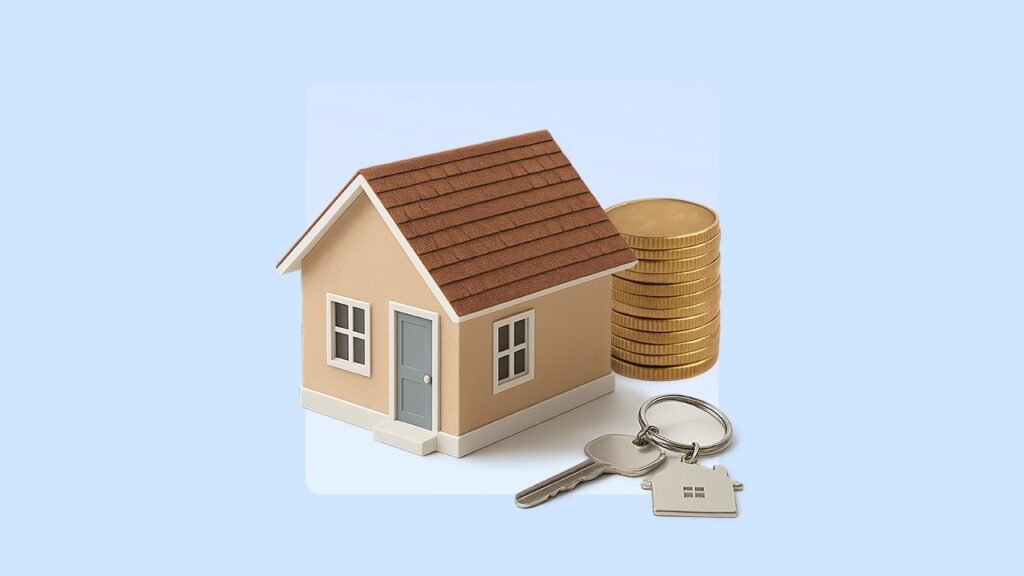Illustration by Mae Sangline/Bankrate
Key takeaways
- Mortgage closing costs are the fees associated with creating a loan and buying a home. You’ll pay most of them on closing day.
- Closing costs typically range from 2 to 5 percent of the total loan amount, and they include fees for the appraisal, title insurance and origination of the loan.
- To lower your closing costs, you can explore options such as negotiating seller concessions and shopping around for service providers.
What are closing costs?
Mortgage closing costs include expenses related to applying for the loan and finalizing a real estate sale. Some of the costs are related to the property, while others are related to the mortgage lender’s services and the paperwork involved in the transaction.
You’ll typically pay most of these costs on closing day — though, if you have certain types of government-backed loans, you may be able to roll the closing costs into your mortgage.
How much are closing costs?
Mortgage closing costs are typically about 2 to 5 percent of your total loan amount. For a $400,000 loan, for example, closing costs could range from $8,000 to as much as $20,000.
The total amount you’ll pay in closing costs depends on three key factors:
- The price of the home
- The home’s location
- Whether you’re buying or refinancing
According to a 2025 report from Lodestar, a closing cost data provider, the average closing costs for a borrower buying a single-family home in the U.S. are $4,661. The average closing costs for a refinance are $2,403.
However, those costs vary widely across the country, partly due to state and local tax laws. For example, in the survey, homebuyers in Washington, D.C. paid the highest average closing costs for a purchase loan, at $17,545. New York and Delaware came in second and third, respectively, with average closing costs of more than $13,000 and more than $12,000. The states with the lowest average closing costs were Missouri ($1,740), Iowa ($1,640) and South Dakota ($1,551).
How to learn your closing costs
Before you close on the home, you’ll receive a mortgage loan estimate, which is a document outlining your mortgage terms and expenses. Some of these expenses are fixed, but the document will specify services you can comparison shop, like title insurance. At least three business days before the closing, you’ll receive a closing disclosure. This is a similar document that lists the final closing costs.
Who pays closing costs?
While the buyer tends to pay many closing costs, the seller is responsible for paying some, too. Buyers can try to negotiate with the seller to cover some of their costs — called “seller concessions” — though that’s typically only feasible if the seller doesn’t have competing offers.
In addition, there are limits on seller concessions, depending on the buyer’s loan type. If you are purchasing a property with a conventional loan, you may negotiate up to 9 percent of the purchase price or appraised value, whichever is lower. FHA loans and USDA loans allow for up to 6 percent, while VA loans have a maximum of 4 percent total. Jumbo loans vary based on the lender.
Closing costs paid by the buyer
Here are closing costs you can typically expect to pay if you’re buying a home:
- Appraisal fee: This fee covers the cost for a licensed appraiser to determine the home’s value. The average appraisal fee for a single-family home is about $350, according to Angi. While this is considered a closing cost, you typically pay it well before closing day.
- Attorney fee: You may choose to use an attorney during your closing, or your state may require one.
- Credit check fee: Chances are, if you’re in the process of purchasing a home, you’ve checked your credit score and report already. But your lender will want to make its own inquiry, and there’s typically a fee associated with doing so.
- Discount points: By purchasing discount points (also called mortgage points), you can lower your mortgage rate. You’ll usually pay 1 percent of the loan principal for a 0.25 percent rate reduction.
- Origination fee: Lenders can charge an origination fee for creating the loan, which is generally 0.5 percent to 1 percent of the amount you’re borrowing. This fee might include other costs, such as the application fee and the underwriting fee.
- Per-diem interest: The per-diem interest rate on a mortgage is the daily interest that’s charged between the closing date and the start of the billing cycle.
- Prepaid homeowners insurance premiums, mortgage insurance premiums, property taxes and homeowners association (HOA) fees: Your lender may require a year of advance insurance and property tax premiums to be held in escrow. If your property is located in a community with a homeowners association, you may have to prepay some of those fees at closing, too.
- Property survey fee: Your lender may require this to confirm that your property boundaries match the title. The cost depends on the property size, the survey type and your location.
- Real estate agent commissions: The buyer’s agent and the seller’s agent typically split a commission of about 5 percent of the sale price.
- Recording fee: This fee goes to a government agency that records the real estate transaction and makes it a public record. It’s often around $125.
- Title insurance policy: Lenders require borrowers to obtain title insurance in case problems arise with ownership after the sale. This policy protects the lender, and the cost is usually about 0.50 percent of the amount of the mortgage. You may also buy your own title insurance for an additional cost.
- Title search fee: Unless you’re buying a new construction home, your lender will have a title company search property records to ensure there aren’t any issues with the title of the home, such as a tax lien. The fee for a title search is around $200.
- Transfer tax: Many states impose a transfer tax when real estate changes hands. Often, the seller pays this tax, but in some places, the cost is shared with the buyer.
Closing costs paid by the seller
Often — though not always — the seller covers the transfer tax. Many states charge a transfer tax on real estate sales. The seller also pays some of the same fees buyers do, such as an attorney’s fee and prorated property taxes.
Who pays real estate agent commissions?
In the wake of a 2024 settlement, sellers may not be responsible for covering commissions for both their real estate agent and the buyer’s agent. Buyers might now need to cover the fees for their own agent, though this will vary by case.
How to lower your closing costs
You can’t get away with not paying any closing costs, but there are ways you can lower the amount. Here are a few ways to reduce closing costs:
- Look for lenders that offer discounts: Consider working with a mortgage lender that doesn’t charge an origination fee or that’ll offer you a discount. If you’re getting your mortgage at your bank, you can also try asking for a discount or fee waiver, since you’re already a customer.
- Apply for down payment assistance: Particularly if you’re a first-time homebuyer, explore down payment assistance and grants that can help cover closing costs.
- Use a no-closing-cost loan: Don’t let the name fool you — you’ll still pay closing costs with a no-closing-cost loan. Instead of paying them upfront, you’ll finance them with your mortgage — and pay interest on them — or pay a slightly higher interest rate.
- Negotiate seller concessions. To encourage a sale, a seller might agree to pay some of your costs.
- Shop around when possible: You’re allowed to shop for certain closing costs, like title insurance, title searches and home appraisals. Getting comparison pricing can help you reduce your closing costs.
FAQ
Additional reporting by Lara Vukelich
Why we ask for feedback
Your feedback helps us improve our content and services. It takes less than a minute to
complete.
Your responses are anonymous and will only be used for improving our website.
Help us improve our content
Read the full article here

















